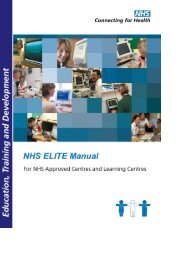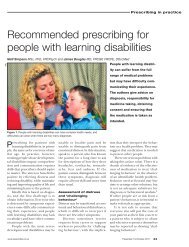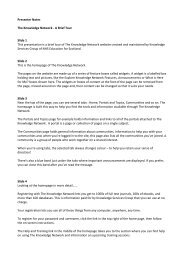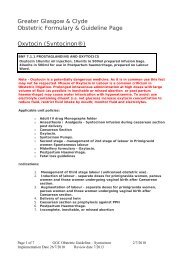The Fife Dementia Strategy: 2010 â 2020 - The Knowledge Network
The Fife Dementia Strategy: 2010 â 2020 - The Knowledge Network
The Fife Dementia Strategy: 2010 â 2020 - The Knowledge Network
You also want an ePaper? Increase the reach of your titles
YUMPU automatically turns print PDFs into web optimized ePapers that Google loves.
egular part of their daily care, and should be individualised to satisfy their<br />
needs and preferences. Activities that centre on the person’s normal daily life<br />
and events, such as preparing a meal, and visiting a local shop or familiar<br />
sight, improves the service user’s quality of life and can positively affect<br />
mortality, depression, physical function and behavioural symptoms for people<br />
with dementia, and improve self esteem and sense of identity 63 .<br />
People living in long term care have an expectation and a right to plan and<br />
participate in meaningful activity as an integral part of their care and not an<br />
optional extra 64 . All service users are to be encouraged to assist in selecting,<br />
planning, and taking part in activities where appropriate. Activities should be<br />
available within and outside the place of care as a regular part of daily living –<br />
allocated activity time must not be the only time activities are engaged in and<br />
all staff must contribute to the daily activities of residents.<br />
In order to ensure meaningful activities are provided for all residents, including<br />
those with dementia, all long term care facilities will have access to a trained<br />
activities coordinator who will have dementia specific activities knowledge and<br />
will work with care staff to assist them in providing opportunities to participate<br />
in individual and group activities on a daily basis to residents. <strong>Fife</strong> Council<br />
activities coordinators will work with other providers to ensure staff are trained<br />
and supported to provide meaningful activities to all residents.<br />
In addition, and in line with the recommendations made in the recent report on<br />
care homes 65 and the National Care Standards 66 which indicate people living<br />
in care homes should “be supported and encouraged to use local services<br />
such as hairdressers, shops and banks”, all people living in long term care will<br />
be given more opportunity to participate in activities outside of the place of<br />
residence. It is recommended that people living in care facilities have a<br />
minimum of two opportunities per month to participate in activities away from<br />
the facility which are suited to their abilities and tastes. This should be<br />
increased over time..<br />
In addition to activities outside of the care facility, there is also a need to<br />
increase access to and utilisation of gardens and out door areas. During<br />
consultations for the <strong>Strategy</strong> many service users reported a desire to user<br />
outdoor spaces more, but experienced difficulty in doing so due to physical<br />
restrictions or a lack of staff availability to assist them. Garden and outdoor<br />
spaces offer valuable opportunities for occupation, mental stimulation, as well<br />
as offer physical and psychological benefits. Appropriate plans to increase<br />
outdoor activities and use opportunities to use the garden must be made by<br />
care staff.<br />
63 SIGN 86 (2006).<br />
64 Care Commision & Mental Welfare Commission for Scotland (2009).<br />
65 Ibid.<br />
66 National Care Standards for Scotland: Care Homes for Older People.<br />
74
















